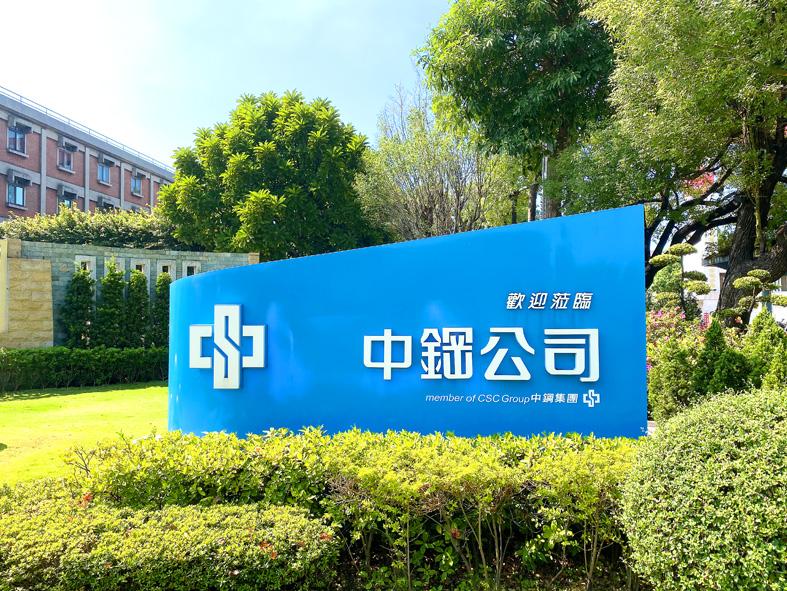China Steel Corp (中鋼), the nation’s largest steelmaker, yesterday said it would reduce domestic steel prices for deliveries next month by 5.61 percent, given lower market demand and falling iron ore prices.
It is the third consecutive month that China Steel has cut domestic steel prices, after a reduction of 2.1 percent last month and 2.23 percent for this month, company data showed.
The steelmaker said that growing concern about a global recession, soaring inflation and the summer vacation in the West are adding to already-sluggish steel demand over the past few months, which was caused by Russia’s invasion of Ukraine, China’s COVID-19 lockdown restrictions and the monsoon season in Southeast Asia.

Photo courtesy of China Steel Corp
Although Beijing is gradually relaxing lockdown restrictions, the Chinese economy has not rebounded as fast as expected, the company said in a statement.
Chinese manufacturers have become more conservative about demand as consumers cut spending amid fears of a recession, it said.
“Sluggish demand and inventory adjustments — amid panic buying by companies earlier this year at the onset of the Russia-Ukraine war — constitute a dual downward pressure on steel prices,” it said.
Raw material prices are also on the downtrend, China Steel said, with the price of iron ore dropping to US$105 per tonne and the price of Australian coking coal declining to US$245 per tonne.
Pushed downward by sluggish demand and lower raw material prices, the prices of hot rolled steel products made in Europe, the US and Asia have tumbled to the lowest levels in the past 12 months, China Steel said.
Global counterparts, such as China’s Baowu Steel Group Croup Ltd (寶武鋼鐵) and Angang Steel Co (鞍山鋼鐵), as well as Formosa Ha Tinh Steel Corp (台塑河靜鋼廠) in Vietnam, have also trimmed steel prices, it said.
China Steel still expects global steel prices to bottom out later this year, as many steelmakers, such as Nippon Steel Corp and ArcelorMittal SA, have begun cutting supply, it said.
The company cut the prices of hot-rolled sheets, hot-rolled coils, cold-rolled coils and hot-dipped zinc-galvanized coils used for construction by NT$2,000 each per tonne, and the price of electro-galvanized coils by NT$1,500 per tonne.

Hon Hai Precision Industry Co (鴻海精密) yesterday said that its research institute has launched its first advanced artificial intelligence (AI) large language model (LLM) using traditional Chinese, with technology assistance from Nvidia Corp. Hon Hai, also known as Foxconn Technology Group (富士康科技集團), said the LLM, FoxBrain, is expected to improve its data analysis capabilities for smart manufacturing, and electric vehicle and smart city development. An LLM is a type of AI trained on vast amounts of text data and uses deep learning techniques, particularly neural networks, to process and generate language. They are essential for building and improving AI-powered servers. Nvidia provided assistance

GREAT SUCCESS: Republican Senator Todd Young expressed surprise at Trump’s comments and said he expects the administration to keep the program running US lawmakers who helped secure billions of dollars in subsidies for domestic semiconductor manufacturing rejected US President Donald Trump’s call to revoke the 2022 CHIPS and Science Act, signaling that any repeal effort in the US Congress would fall short. US Senate Minority Leader Chuck Schumer, who negotiated the law, on Wednesday said that Trump’s demand would fail, while a top Republican proponent, US Senator Todd Young, expressed surprise at the president’s comments and said he expects the administration to keep the program running. The CHIPS Act is “essential for America leading the world in tech, leading the world in AI [artificial

DOMESTIC SUPPLY: The probe comes as Donald Trump has called for the repeal of the US$52.7 billion CHIPS and Science Act, which the US Congress passed in 2022 The Office of the US Trade Representative is to hold a hearing tomorrow into older Chinese-made “legacy” semiconductors that could heap more US tariffs on chips from China that power everyday goods from cars to washing machines to telecoms equipment. The probe, which began during former US president Joe Biden’s tenure in December last year, aims to protect US and other semiconductor producers from China’s massive state-driven buildup of domestic chip supply. A 50 percent US tariff on Chinese semiconductors began on Jan. 1. Legacy chips use older manufacturing processes introduced more than a decade ago and are often far simpler than

Gasoline and diesel prices this week are to decrease NT$0.5 and NT$1 per liter respectively as international crude prices continued to fall last week, CPC Corp, Taiwan (CPC, 台灣中油) and Formosa Petrochemical Corp (台塑石化) said yesterday. Effective today, gasoline prices at CPC and Formosa stations are to decrease to NT$29.2, NT$30.7 and NT$32.7 per liter for 92, 95 and 98-octane unleaded gasoline respectively, while premium diesel is to cost NT$27.9 per liter at CPC stations and NT$27.7 at Formosa pumps, the companies said in separate statements. Global crude oil prices dropped last week after the eight OPEC+ members said they would